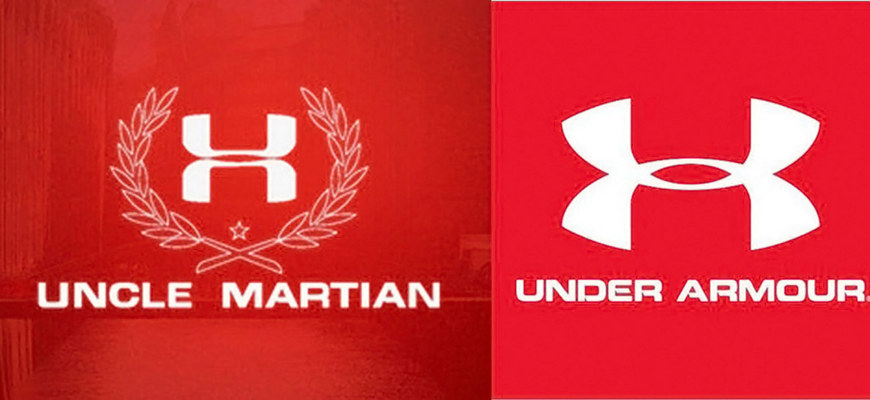IP briefing: China – a friendlier place for IP rights?

Under Armour has celebrated a rare victory in China’s highest court in a trade mark infringement judgment issued in July. Companies have traditionally found it notoriously difficult to enforce their intellectual property rights in China, but Under Armour’s success could spell a new trend.
Under Armour argued its case before the People’s Higher Court of Fujian Province, with the appeal being heard before the Supreme People’s Court. It alleged that Fujian Tingfeilong Sporting Goods Co, Ltd infringed its intellectual property rights by using a logo that was substantially similar.
Under Armour is a US-based company, founded in 1996, which sells sports clothes and shoes. It has been hailed by Forbes as one of the fastest-growing companies in the apparel industry, making $5.2 billion in 2018. Fujian Tingfeilong launched its own sporting brand named “Uncle Martian” in 2016.
The Under Armour brand has a number of trade marks registered in China and it also has a Chinese language equivalent of its brand name. In deciding the case, a number of factors were considered. First, the logo was used substantially by the Uncle Martian brand. It featured on brand press conferences, investment promotion advertisements, the business premises of Uncle Martian, brochures, shoes, wristbands and T-shirts. Secondly, Tingfeilong used “Under Armour (China) Co, Ltd” on its business cards even though it had no relationship whatsoever with the company. Under Armour alleged that this amounted to unfair competition.
Under Armour won its case on both trade mark infringement and unfair competition. This has been a longrunning dispute between the two companies, with Under Armour first filing its case before the Fujian Province court in 2016. The Court of First Instance issued an injunction to stop the Uncle Martian brand from using the logo. Tingfeilong was also ordered to destroy the infringing products, pay damages totalling $300,000 and publish a public apology. The Supreme People’s Court, on appeal, stated that “Tingfeilong’s appeal request cannot be established and should be rejected; the first instance judgment has clearly established the facts and the applicable law is correct and should be maintained.”
A better climate?
The case marks an interesting turn in the tide for companies wanting to enforce their intellectual property rights in China. In the European Commission’s biennial Report on the protection and enforcement of intellectual property rights in third countries, published in January this year, China was ranked as Europe’s “priority 1” worst offender. Indeed, China and its territory Hong Kong account for more than 80% of the seized counterfeit goods within the EU. This reflects a large-scale problem that has been ongoing for years. A recent US report estimated that IP theft damaged the US economy by between $180 billion and $540 billion a year. Additionally, the European Commission’s report stated that sales, jobs and government tax intake are all affected by IP theft.
It appears that China has taken notice of its trading partners’ complaints. It has recently published a national plan to combat intellectual property infringement. The plan, titled Key points of the National Work to Crack Down on Intellectual Property Infringement and the Production and Sale of Counterfeit and Inferior Commodities in 2020, was published on 5 June. It contains a list of 35 points that the Chinese Government will consider in its attempt to combat IP theft, the most relevant of which is to “strengthen protection of intellectual property rights of foreign-invested enterprises”, and “intensify multi-bilateral exchanges and cooperation”. China is already seen to be working hard on this plan, as the following month it sentenced four people to prison for producing and selling counterfeit Dyson hairdryers.
China’s trading partners shall be cautiously optimistic as the country attempts to crack down on IP infringement. Both the EU and the US have previously criticised China on how it enforces and regulates intellectual property rights. Indeed, it has been a longstanding concern that non-Chinese companies seeking to enforce their rights can face a very long and hard battle with little prospect of success. It is interesting that the month before US-based company Under Armour’s success, the Chinese Government published its national plan, with one of the focuses being to improve foreign exchanges and cooperation. All eyes are now on China to see if the tide is turning on the enforcement and regulation of intellectual property rights within the state.
Regulars
Perspectives
Features
Briefings
- Civil court briefing: Lessons from a video proof
- Corporate briefing: Business support: going our own way
- IP briefing: China – a friendlier place for IP rights?
- Agriculture briefing: Was there a croft here?
- Scottish Solicitors' Discipline Tribunal
- Planning obligations: seeking better practice
- Construction briefing: Rough justice, smoother delivery







